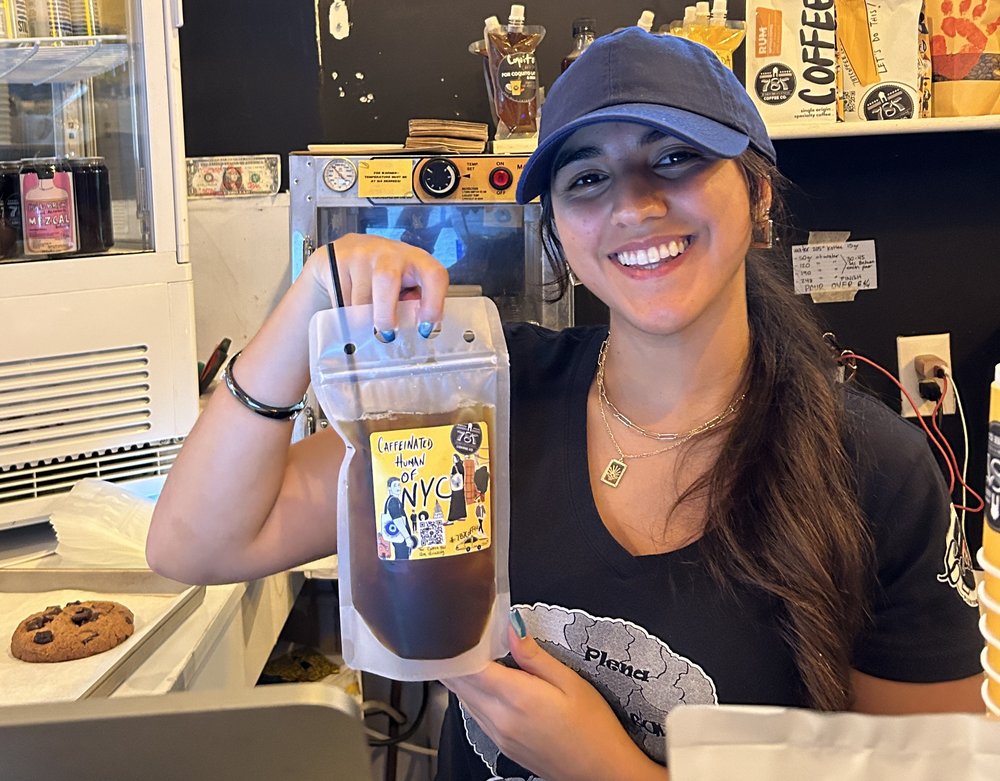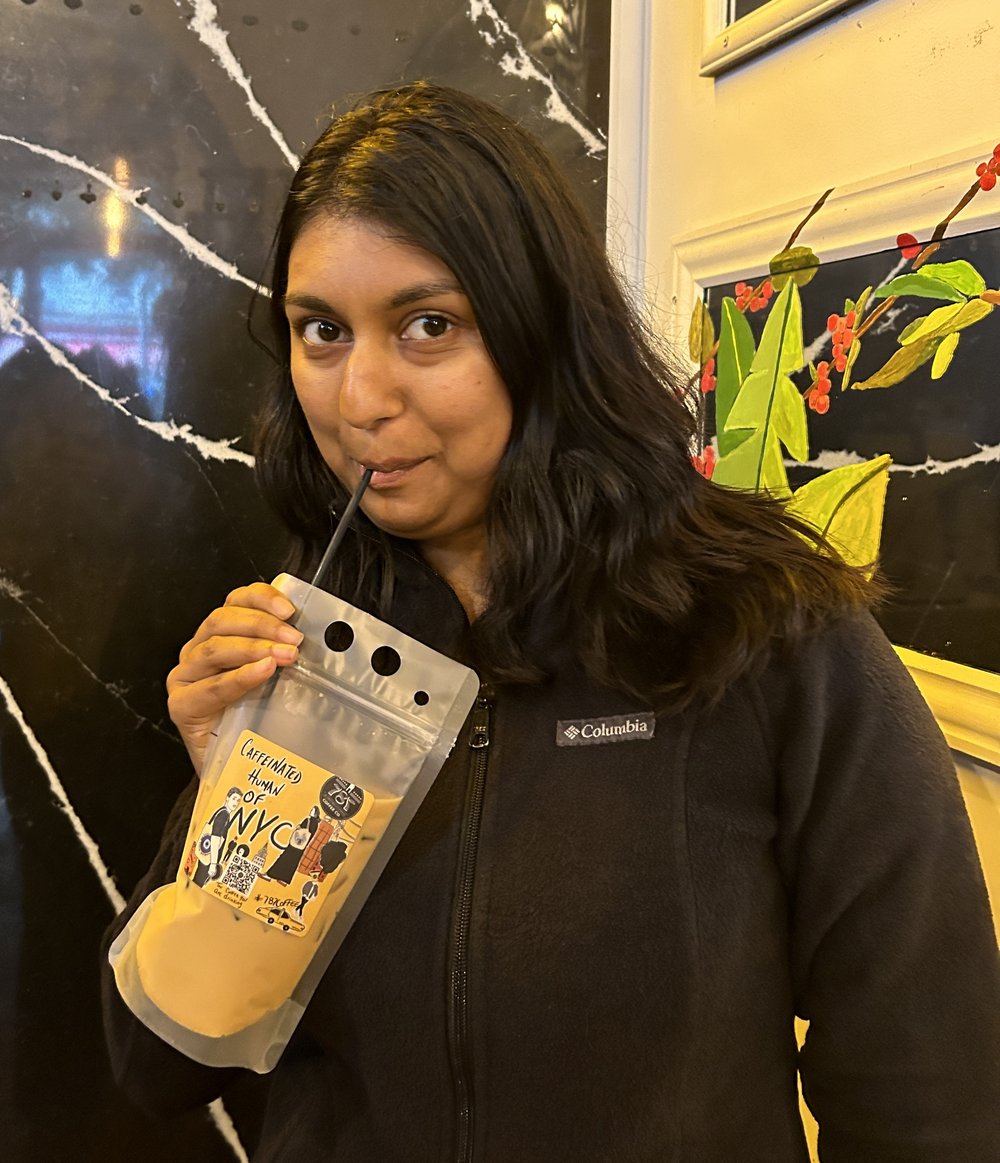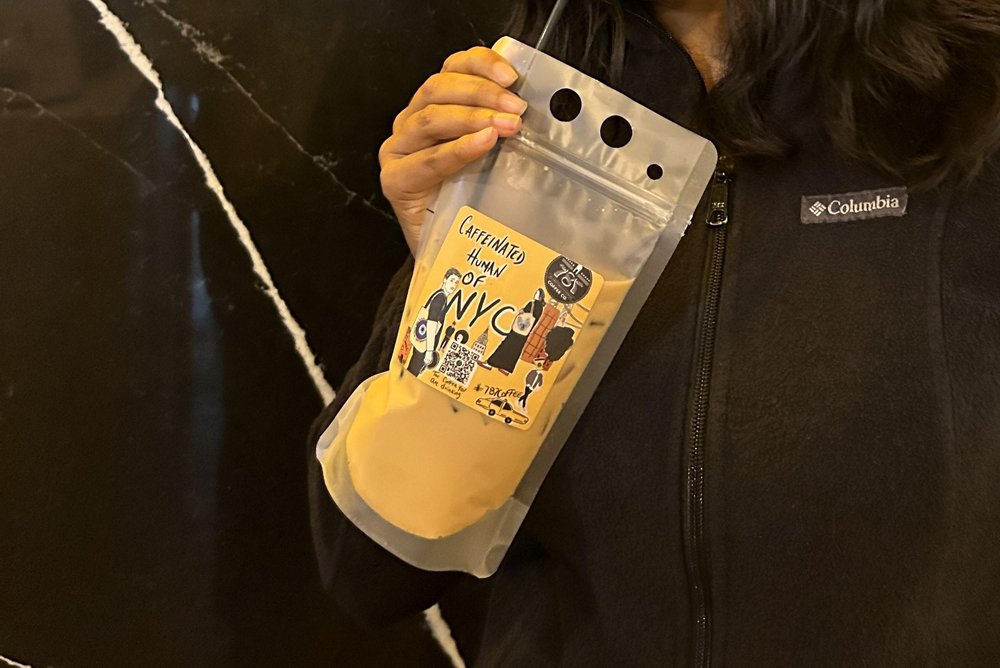Is this coffee pouch being sold in NYC more like 'Capri Sun' or a 'colostomy bag'?
Oct. 17, 2024, 6:01 a.m.
New Yorkers are highly divided over a popular coffee chain’s plastic pouches.

Ever wanted your coffee served in something like an IV bag?
Look no further than 787 Coffee, a Puerto Rican chain of coffee shops with 27 outposts in New York, Puerto Rico and Texas. The chain is beloved among fans for its “farm-to-coffee cup experience,” Caribbean-inspired drinks and for only selling iced drinks in plastic pouches.
“It reminds me of a Capri Sun,” said Alia San Filippo, 30, who sipped the last of her bagged espresso on a recent Wednesday at the Williamsburg location.

The chain launched the pouches in April 2023, touting them as a more sustainable option than to-go cups. It has now done away with all its plastic cups and exclusively uses the pouches in all its stores.
Perhaps unsurprisingly, New Yorkers are divided about this newfangled approach. Some praise the innovation, while others dislike the pouches so much they're embarrassed to be seen with them.
“They dissolve faster than hard plastic, reducing their environmental impact,” 787's cofounder Brandon Pena said in a statement. “They are reusable, which allows customers to repurpose in creative ways.”
Most customers at the Brooklyn store said it's not the environmentally friendly element that attracts them — it’s the online hype.
“We get a good amount of people saying, ‘Oh, I saw this on TikTok. Do you have the bags? Do you have the pouches?’” said Mirielle Maor, who oversees several of the cafes in New York. “The excitement is high.”
Buzz for the bags exploded last year, including when Delaney Ager, 24, raved about them in a September 2023 TikTok vlog that’s since racked up more than 620,000 views. While some commenters loved the bags, others critiqued the aesthetics, and others likened them to “colostomy bags.”

Back at the coffee shop, baristas disagreed. “I prefer the bags over cups,” said Vick Garces, 24, who works at the Williamsburg location. “It’s easier to carry.”
Online, the store encourages customers to turn the bags into water bottles, planters, flower vases — and even necklaces.
“I used it maybe once after and tried to put cut-up fruit in it,” said Ager, the influencer. “But not again.”
With little public information available about the bags’ environmental impacts, some questioned their ecological bona fides, pointing out that the bag still uses plastic straws.
Coffee drinks at 787 are also more expensive than what you might expect to pay for a cup of coffee: They start at around $7 for a cold brew, nearly $9 for an iced coquito latte, and nearly $12 for an iced horchata latte.
Prices didn’t rise because of the bags, however. Maor said the costs are due to the fact that the coffee is grown in the United States, taxes are included and the value is high. All the coffee comes from the company’s farm in Maricao, Puerto Rico — hence the name “787,” which is the local area code.
Pedro Villalta, a 32-year-old fan of 787, visited the farm during a vacation. He said the pouches are a “fun moment.”
“Every other visit, I’ll buy one,” he said. “It’s the presentation. It’s an enjoyable thing. It reminds me of summer and just, like, a good time.”
Villalta said his coquito latte — a drink with espresso, nutmeg and coconut cream — was on par price-wise with other beverages in the area. “I'm a New Yorker. I was raised here,” he said. “I think it's a wonderful addition to bring Puerto Rican culture back into the neighborhood.”
Regardless of opinion, the pouches went viral for a reason. Colleen Kirk, a marketing professor at the New York Institute of Technology, said it’s likely due to a phenomenon called “psychological ownership.”
The coffee bags at 787 “satisfy consumers’ motivations for control and ownership in multiple ways,” she said. Customers feel like they “own” the bag because they can more easily manipulate the plastic, can often better carry it, and have a hand in the “disposal process” when they recycle or reuse it.
Marion Nestle, an NYU professor of health and nutrition, wondered if the appeal was “part of a general trend toward infantilization.”
“I can only speculate,” she said. “Kids get to drink from pouches, so why not me too?”
The bag also stands for the shop’s identity, at least according to Adam Alter, a marketing professor at NYU. He compared the pouches with Apple’s famous switch to white headphones from the standard black in 2001.
“Coffee cups are black headphones; they're used by almost every coffee shop,” he said. “Pouches are white earphones; they're unique, and so they stand out and signal that a person is drinking 787.”
These Brooklyn coffee shops are asking customers to stop tipping In Greenpoint, a wacky new birding group is ruffling some feathers You should see this art exhibit in Chelsea, but don't research it first